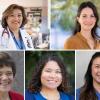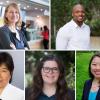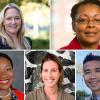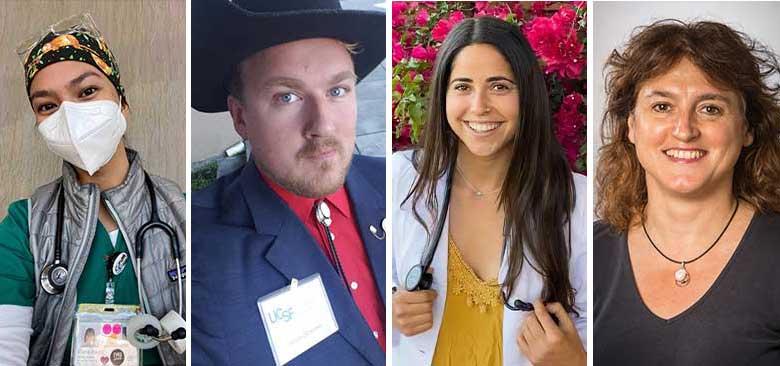
From left, School of Nursing student Diana Alegre, ICU nurse Jason Bloomer, student Gal Haroush and assistant professor Elena Portacolone.
How the Pandemic Impacted Me
For many nurses, the COVID-19 pandemic has reinforced and sharpened their commitment to health care and our communities. We asked a few alumni, students and faculty to share their experiences. These are their stories.
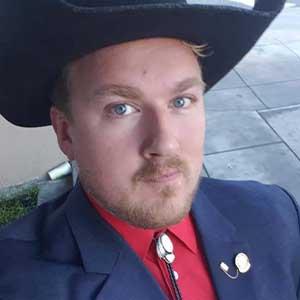 Jason Bloomer, MS ’21, RN
Jason Bloomer, MS ’21, RN
I moved to San Francisco in September 2019 to pursue my MS in Nursing Health Policy and to work in the COVID ICU. I moved to the city with an idyllic life and educational plan that was unfortunately derailed by the pandemic.
As an experienced ICU nurse, fragile and clinically unstable patients were typical, but with COVID it felt different. We were all learning and working together trying to battle a virus whose sole purpose is to propagate and thrive. While there is plenty of evidence-based practice that is available to treat respiratory illnesses, we had to adjust our expectations and treatments to a more patient-specific focus for this patient population. Interventions we do regularly are not as effective as we hope they would be, and in many cases, we felt defeated in our work. Nurses would work tirelessly to save a life and when that was no longer an option, we stood vigil and held the hands of those we lost so that they would not pass alone.
In the darkness, it can be difficult to find the light, but I feel more passionate than ever about my profession and now my new specialty. Even though the last year has been challenging, I know that there are solutions to be found, discrepancies to correct and opportunities moving forward. I have seen the impacts of policy firsthand as a bedside RN, and now have the education and training to do more about it.
Gal Haroush, Master of Science student, RN 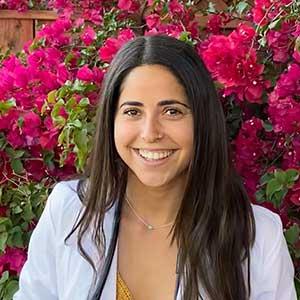
On Dec. 9, 2020, I received an email from Mary Foley, interim director of the Master’s Entry Program in Nursing (MEPN), requesting MEPN students to volunteer in various roles for the COVID- 19 vaccine rollout at UCSF.
The email’s final line read: “Are you ready to be a part of history?”
I checked the email just five minutes after it was sent. When I opened the attached sign-up sheet, nearly all of the 80 shifts were already filled. The message from my cohort was loud and clear: We are ready.
Maybe some of my classmates felt anxious, but I don’t think that stopped anyone from volunteering. We moved forward, learning about public health measures, protecting the greater good and taking the next step to move on from this pandemic.
I volunteered at UCSF’s vaccination clinic on the Parnassus campus, a site where many UCSF employees got vaccinated. At first, MEPN students, like myself, greeted visitors, filled out vaccine cards and performed other administrative tasks. Eventually, we administered the vaccine. I still remember some employees crying tears of joy. It felt like the first good thing to happen since the pandemic began.
Public health nursing wasn’t on my radar prior to coming to UCSF, but it is now. This experience made me want to play a bigger role in my community — to learn how to take care from an individual level to the community level. I don’t think there’s ever been a more relevant time for that.
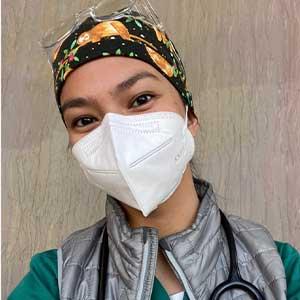 Diana Alegre, Master of Science student, RN
Diana Alegre, Master of Science student, RN
As a student in the UCSF School of Nursing’s MEPN program at the peak of the COVID-19 pandemic, I immersed myself in an environment and mindset of learning how to save lives while learning to navigate the limitations of human connections in acute care settings.
As a Filipino immigrant first-gen grad student, I yielded to my core values in community, empathy and caring to stride through the challenges of managing care for multiple acutely ill patients. With nine-hour Zoom lectures and back-to-back 12-hour shifts in medical-surgical units, pediatrics, psychiatry, labor and delivery, and community health — and all the in-betweens of addressing nursing issues, socio-cultural health and racial injustices — I gained invaluable knowledge, skills, connections and understanding of the deep work that nurses engage in. I learned how to pack wounds, administer medications, assess health status, advocate for care, assist delivering newborns, educate patients about their health and administer COVID-19 vaccines — while providing vaccine education to community members at high risk for infection. But perhaps my most important role was to sit by my patients and listen to their stories. Our vulnerable and real conversations reminded me of the importance of human connection and social support during a time of global duress and pain.
Through the blood, sweat and tears of a tumultuous year, my experiences solidified my passions and commitment for nursing and health care. As deeply taxing (emotionally, mentally and physically) my experiences have been, it has also been incredibly rewarding and humbling to learn how to work in a profession that focuses on caring and healing for others.
Elena Portacolone, PhD, MBA, MPH, Associate Professor 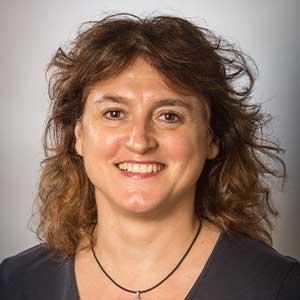
Our research team conducted three unplanned, qualitative investigations on older adults with cognitive impairment who were living alone to understand how the pandemic affected them. First, we phoned more than 20 of these individuals to understand how they were doing during this difficult time. Next, we conducted eight virtual focus groups in Black communities in Detroit and the San Francisco Bay Area to understand whether and how their idea of trust changed because of the pandemic. Finally, we interviewed 12 providers of services to Latino communities and organized three virtual focus groups with Latino participants in Fresno and Los Angeles.
Conducting these investigations during the pandemic made me ask these questions: What am I doing to serve my study participants? How can I support participants in such a difficult time? How can we as researchers support one another? What is the role of UCSF as an anchor institution during public health crises? Overall, these investigations compelled me to reflect on service, and led me to the conclusion that service precedes research. In other words, I first need to make sure that I can serve study participants and the research team. Then, provided that I have the capacity to serve, I can initiate research.

